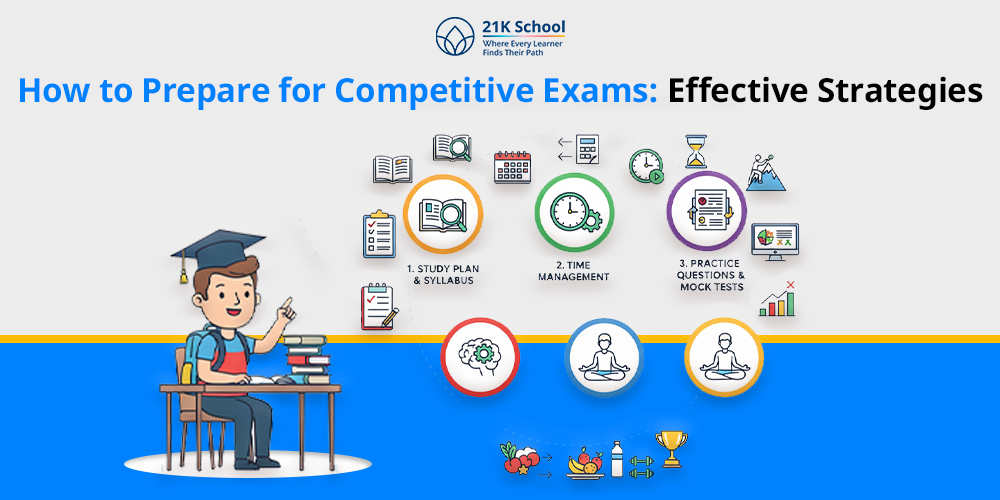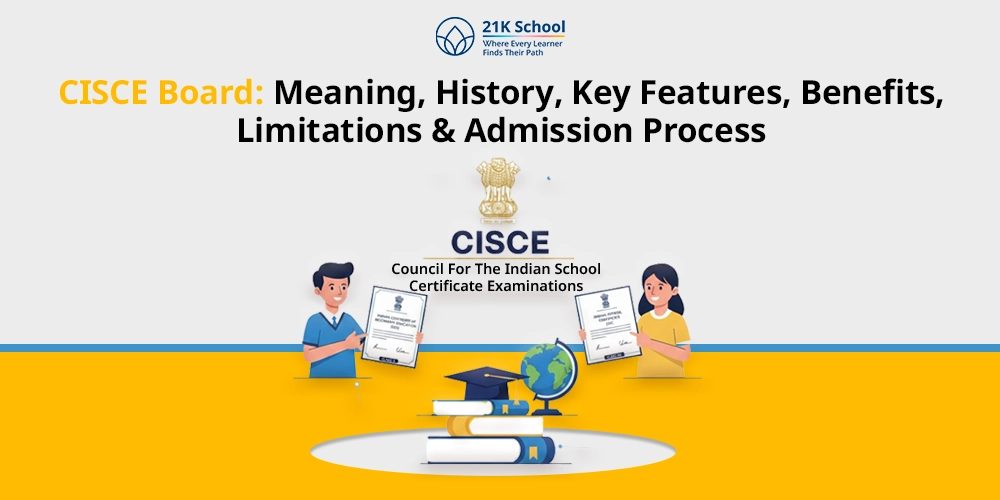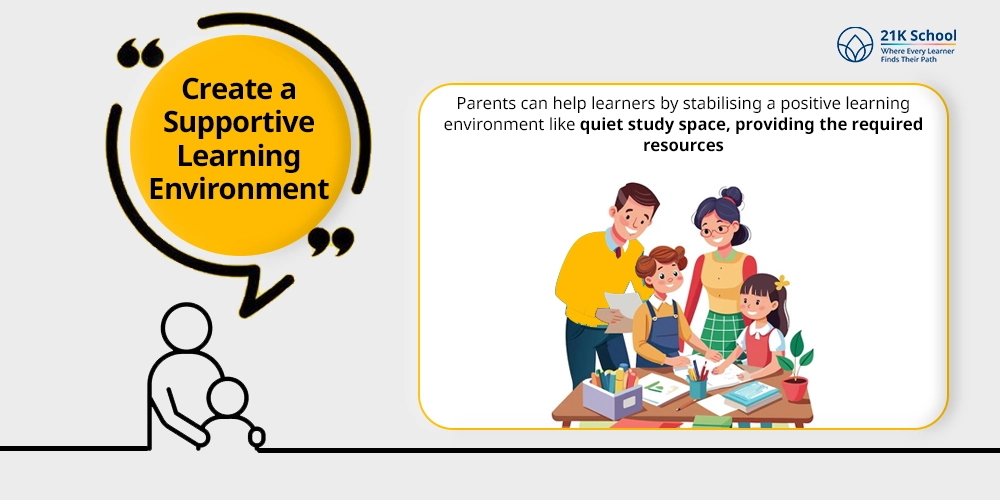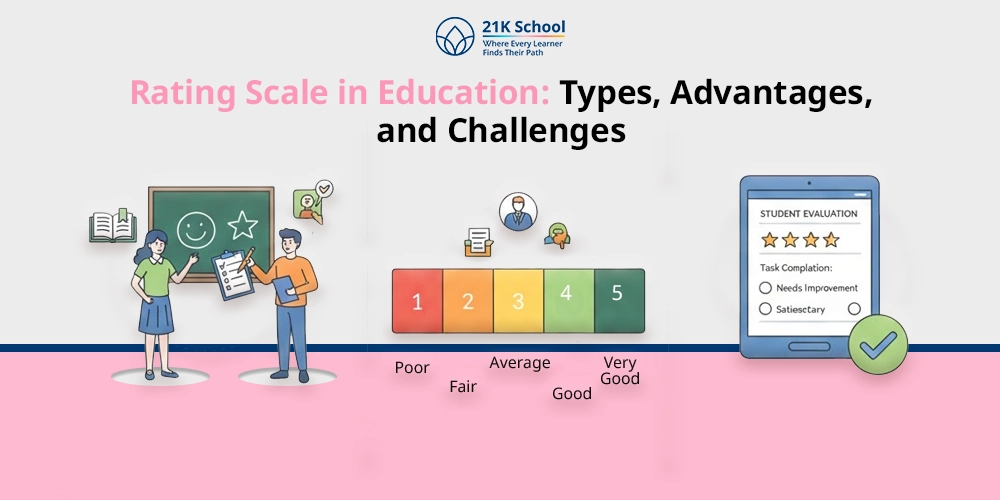
In students’ lives competitive exams are both exciting and challenging tasks which require focus and discipline to conquer. They often think about how to get good marks in exams ?
No matter if a student is preparing for medical, engineering, banking, or any other popular examination, strategic preparation is more impactful than hard work.
Remember that studying smart, staying consistent, and managing time effectively is more beneficial than continuous learning such as 10 hours a day.
With right preparation and strategic learning students can gain desired results and turn the toughest exams into achievable goals.
If someone is preparing for a competitive exam then below mentioned top 13 strategies on how to prepare for competitive exams are ideal to proceed.
Contents
- What Are Competitive Exams?
- How to Prepare for Competitive Exams: Top 13 Ways
- 1. Understand the Exam Pattern and Syllabus
- 2. Create a Realistic Study Plan
- 3. Setting Up a Strong Foundation
- 4. Set Clear and Achievable Goals
- 5. Gather the Right Study Material
- 6. Focus on Conceptual Understanding
- 7. Practice Regularly with Mock Tests
- 8. Develop Time Management Skills
- 9. Maintain a Consistent Study Routine
- 10. Stay Physically and Mentally Fit
- 11. Revise Regularly through Different Methods
- 12. Stay Positive and Motivated
- 13. Seek Guidance and Peer Learning
- Conclusion
What Are Competitive Exams?
Competitive exams are standardised tests conducted to select the most suitable candidates for further education or job opportunities.
Students got selected based on their knowledge , aptitude, and problem-solving ability. It also includes the number of seats/positions available to get selected in a particular year.
Some of the common competitive exams conducted in India are:
- Academic Entrance Exams: JEE, NEET, CUET, CAT, GRE, etc.
- Government Exams: UPSC, SSC, Banking, Railways, State PSC, etc.
- Professional Certification Exams: CA, CFA, CLAT, and others.
- Scholarship & Talent Exams: NTSE, Olympiads.
How to Prepare for Competitive Exams: Top 13 Ways
Students who are preparing for competitive exam can go through the below mentioned top 13 strategies to improve their learning capabilities:
1. Understand the Exam Pattern and Syllabus
Students who explore and understand the examination pattern and syllabus before starting preparation of competitive exams become more focused.
One must go through the official syllabus of a particular year to discover the number of sections, subjects, marking scheme, topic weightage, negative marking policy etc.
It is an ideal way to make study plans and give more preference to higher weightage topics.
2. Create a Realistic Study Plan
After understanding what to study, students must create a realistic study plan for the particular competitive exam.
One must ensure the plan includes a balance of both time and subject especially in difficult topics.
To make an effective study time table , students can divide syllabus according to time remaining, make daily goals, short breaks and don’t forget to revise for retention.
3. Setting Up a Strong Foundation
Competitive exams require a strong foundation to understand and practice advanced topics.
Various subjects like maths and Science need a core understanding of principles to increase efficiency.
Learning from NCERT books, immediately clarify doubts, and focus on “why” help in learning the basic-level questions before reaching complex questions.
4. Set Clear and Achievable Goals
Set clear and achievable goals motivate students to work efficiently and track progress which builds confidence.
Instead of stressing out one can break larger tasks into smaller ones to learn easily. Short milestones are easy to crack and promote a growth mindset.
Follow the SMART principle, weekly mock tests, and time-bound tasks are ideal ways.
5. Gather the Right Study Material
Quality study material plays a major role in the preparation of competitive exams. Gather the desired material to learn without distraction.
To choose, follow recommended books, previous years’ question papers, mock tests, e-learning platforms , and prepare your own notes for revision.
6. Focus on Conceptual Understanding
Students often hurry to complete the syllabus instead of focusing on conceptual understanding. Rote learning is not the only way.
Competitive exams test students ability to apply knowledge with the help of mind maps, flowcharts, and videos etc.
By truly understanding the concept they can easily retain it for a longer term.
7. Practice Regularly with Mock Tests
Students often indulge in learning and memorising different concepts and forget to practice regularly with mock tests.
Mock tests are an ideal way to understand whether a student is capable of recalling the chapters or need revisions.
This can be done by creating the actual exam environment such as taking the full-length mock tests on weekends, performance review and feedback, and identifying the area of improvement.
8. Develop Time Management Skills
Competitive examinations require dedication and time to complete and retain the syllabus. To achieve desired rank one must develop time management skills .
Managing time while preparation is a key to success. Students can use different techniques to improve such as Pomodoro Technique.
This is not only helpful to complete the syllabus but also guides for self-control and concentration. Must understand the importance of time management in exams .
9. Maintain a Consistent Study Routine
Preparation of a competitive exam is a long-term goal in which students need to maintain a consistent study routine .
By setting a dedicated space and time for each subject, avoid distractions, breaks while studying, and reward yourself for completion maintain consistency.
Remember, with consistency smart efforts and good habits are also important.
10. Stay Physically and Mentally Fit
A good body and active mind is a key to achieving success like clearing a competitive exam. However, it does not mean that one should spend long hours studying without breaks.
A healthy body requires timely sleep, good food, and learning without stress or burnout. Also, explore how many hours of sleep is enough for a student .
One must sleep 7 to 8 hours, perform physical exercise or yoga, meditation for focus and stay hydrated.
11. Revise Regularly through Different Methods
To retain information strategic revisions is required especially in competitive exams where syllabus or content are longer.
Students need to revise regularly through different methods for long-term retention.
Use of mind maps , flashcards, and summary notes etc can be helpful for students.
12. Stay Positive and Motivated
Competitive exams require long term preparation for one day examinations. That’s why we need to maintain a positive mindset to achieve the desired result.
Focusing on the end goal, taking help from mentors or friends, positive learning environment , avoid negative thoughts and distraction.
All these together guide students to perceive, understand, use, and manage learning.
13. Seek Guidance and Peer Learning
By taking guidance from mentors, teachers, or parents students can make a big difference in their preparation.
Peer learning is also an ideal approach in which students are involved in various educational activities such as study groups, collaborative projects, and peer tutoring etc.
Conclusion
The importance of examinations in students’ lives is to measure progress.
Instead of the traditional classroom approach students in the modern world can use various effective strategies to prepare for competitive exams.
Success in competitive exams is a combination of preparation, perseverance, and the belief to achieve better. To do so one needs to learn daily with focus.
Follow the above mentioned 13 ways on how to prepare for competitive exams to determine how to study for exams effectively
.
Remember, both physical and mental strength is required to achieve the desired success and career growth. Also, explore how to overcome exam fear
.



